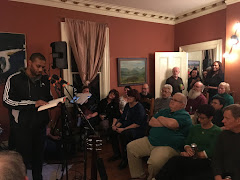
Saturday, April 02, 2011
Dawn Revisited
Imagine you wake up
with a second chance: The blue jay
hawks his pretty wares
and the oak still stands, spreading
glorious shade. If you don’t look back,
the future never happens.
How good to rise in sunlight,
in the prodigal smell of biscuits –
eggs and sausage on the grill.
The whole sky is yours
to write on, blown open
to a blank page. Come on,
shake a leg! You’ll never know
who’s down there, frying those eggs,
if you don’t get up and see.
with a second chance: The blue jay
hawks his pretty wares
and the oak still stands, spreading
glorious shade. If you don’t look back,
the future never happens.
How good to rise in sunlight,
in the prodigal smell of biscuits –
eggs and sausage on the grill.
The whole sky is yours
to write on, blown open
to a blank page. Come on,
shake a leg! You’ll never know
who’s down there, frying those eggs,
if you don’t get up and see.
When You Leave
This sadness could only be a color
if we call it momoiro, Japanese
for peach-color, as in the first story
Mother told us: It is the color of the hero’s skin
when the barren woman discovered him
inside a peach floating down the river.
And of the banner and gloves she sewed
when he left her to battle the horsemen, then found himself
torn, like the fruit off a tree. Even when he met a monkey
dog and bird he could not release
the color he saw when he closed his eyes.
In his boat
the lap of the waves against the hold
was too intimate as he leaned back to sleep.
He wanted
to leave all thoughts of peach behind him –
the fruit that brought him to her
and she, the one who opened the color forever.
if we call it momoiro, Japanese
for peach-color, as in the first story
Mother told us: It is the color of the hero’s skin
when the barren woman discovered him
inside a peach floating down the river.
And of the banner and gloves she sewed
when he left her to battle the horsemen, then found himself
torn, like the fruit off a tree. Even when he met a monkey
dog and bird he could not release
the color he saw when he closed his eyes.
In his boat
the lap of the waves against the hold
was too intimate as he leaned back to sleep.
He wanted
to leave all thoughts of peach behind him –
the fruit that brought him to her
and she, the one who opened the color forever.
Who Said It?
"We can forgive Major Colvin, who out of his frustration and despair, found himself condoning something which can't possibly be condoned. We can do that much. But, gentlemen, what we can't forgive, what I can't forgive, ever, is how we, you, me, this administration, all of us, how we turned away from those streets in West Baltimore. The poor, the sick, the swollen underclass of our city, trapped in the wreckage of neighborhoods which were once so prized, communities which we failed to defend, which we surrendered to the horrors of the drug trade. And if this disaster demands anything of us as a city, it demands that we say enough; enough to the despair which makes policemen even think about surrender; enough to that fact that these neighborhoods are not saved or are beyond saving; enough to this administration’s indecisiveness and lethargy, to the garbage which goes uncollected, the lots and rowhouses which stay vacant; the addicts that go untreated. The working men and women who every day are denied a chance at economic freedom. Enough to the crime which everyday chokes more and more of the life from our city. And, the thing of it is if we don’t take responsibility and step up , not just for the mistakes and the miscues, but for whether or not we are going to win this battle for our streets. If that doesn’t happen we are going to lose these neighborhoods and ultimately this city, forever. If we don’t have the courage and the conviction to fight this war the way it should be fought; the way it needs to be fought, using every weapon we can possibly muster; if that doesn’t happen, then we are staring at defeat. And that defeat should not and cannot and will not be forgiven.
Councilor Thomas J. Carcetti, City of Baltimore
AKA Aidan Gillen. “The Wire” Season 3, Episode 12 “Mission Accomplished”
Councilor Thomas J. Carcetti, City of Baltimore
AKA Aidan Gillen. “The Wire” Season 3, Episode 12 “Mission Accomplished”
Subscribe to:
Posts (Atom)



